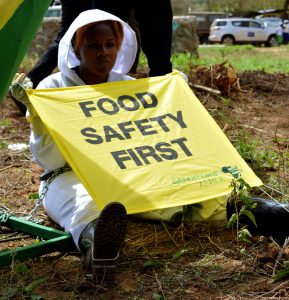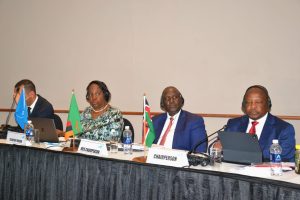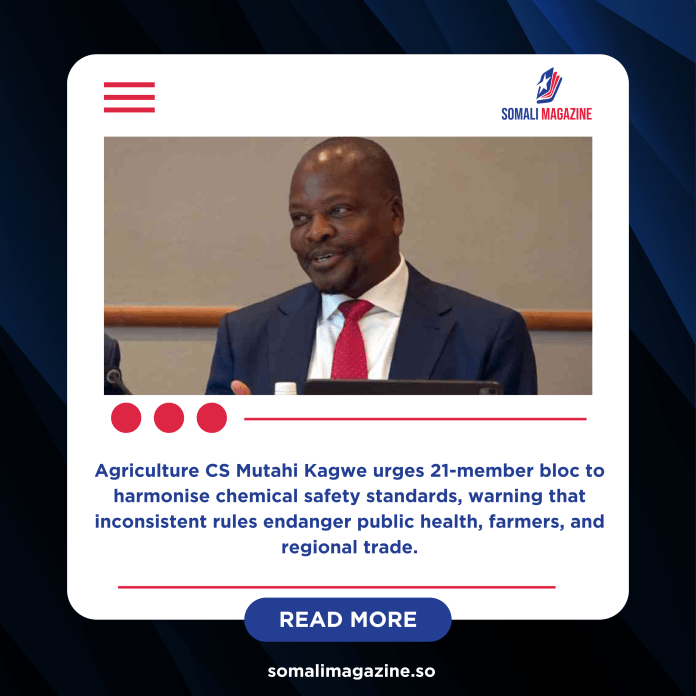Facebook Twitter (X) Instagram Somali Magazine - People's Magazine
Kenya’s Agriculture Cabinet Secretary Mutahi Kagwe has urged the Common Market for Eastern and Southern Africa (COMESA) to introduce a region-wide ban on harmful pesticides. He says the move is necessary to protect food safety, public health, and agricultural trade across the 21-member bloc.
Speaking on Friday, August 8, at the 9th Joint COMESA Ministerial Meeting on Agriculture, Natural Resources, and Environment in Lusaka, Zambia, Kagwe warned that inconsistent pesticide regulations between member countries are putting people and the farming industry at risk.
Danger of inconsistent rules
According to Kagwe, some pesticides banned in certain COMESA countries are still allowed in others. This creates loopholes that unscrupulous traders exploit, moving hazardous chemicals across borders to avoid restrictions.
“The current situation where a pesticide banned in one country continues to be used next door completely undermines our collective sanitary and phytosanitary efforts,” Kagwe said. “We are exposing our farmers, our consumers, and our markets to unnecessary and unacceptable risk.”

He stressed that without a common approach, harmful chemicals will keep entering food systems, leading to contamination, loss of consumer trust, and challenges in exporting agricultural produce.
A call for harmonised standards
Kagwe proposed the immediate harmonisation of chemical safety standards across COMESA. This would mean that if a pesticide is banned in one member country, it would automatically be banned in all others. He argued that this step is not optional but urgent if the region wants to ensure food safety and protect public health.
“We must not let fragmented policies stand in the way of our people’s safety. Harmonising chemical standards is urgent,” he said.
Kenya’s additional proposals
Besides the pesticide ban, Kenya made other suggestions to strengthen regional agriculture. These included:
-
Sharing agricultural technologies, such as livestock vaccines, among member states.
-
Developing joint rules for cross-border trade in certified seeds.
-
Using digital tools and innovations for better agricultural planning.

Kagwe also called for COMESA to move beyond policy discussions and become a more action-oriented body that delivers real benefits for farmers and consumers. He said bold leadership is needed to turn the organisation into a platform for economic growth, agricultural resilience, and food independence.
Impact of hazardous pesticides in Kenya
In Kenya, the continued use of hazardous pesticides has already caused financial losses. These come not only from rejected agricultural exports but also from the economic effects of banning pesticides without offering farmers affordable and effective alternatives. Farmers often struggle to replace banned products, which affects their productivity and income.
Kagwe believes that if COMESA adopts the proposal, it would protect farmers while maintaining fair trade practices within the region. A joint ban would also make it harder for banned chemicals to re-enter markets through neighbouring countries.
Countries that would be affected
If approved, the ban would apply to all 21 COMESA member states: Burundi, Comoros, Democratic Republic of Congo, Djibouti, Egypt, Eritrea, Eswatini, Ethiopia, Kenya, Libya, Madagascar, Malawi, Mauritius, Rwanda, Seychelles, Somalia, Sudan, Tunisia, Uganda, Zambia, and Zimbabwe.
A push for urgent reform
Kagwe ended his address by reaffirming Kenya’s commitment to working with other member states to make regional food systems safer and more reliable. He stressed that the protection of farmers, consumers, and markets should come before political or trade differences.
“Effective regional food safety cannot exist without a common regulatory approach,” he said. “We must act now, not later.”
The proposal will now be considered by COMESA, which represents over 640 million people in Eastern and Southern Africa. If the pesticide ban is enforced, it would be one of the most significant steps the bloc has taken to improve public health and safeguard agriculture in the region.

